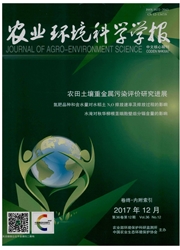

 中文摘要:
中文摘要:
硝化作用是导致我国农业氮肥利用率低以及地表水和地下水污染的主要原因,且对温室气体氧化亚氮(N2O)的排放具有显著影响。硝化抑制剂可通过选择性抑制土壤硝化微生物的活动,有效减缓土壤中铵态氮向硝态氮的转化,是农业生产中常用的提高氮肥利用率和减少硝化作用负面效应的一种有效管理方式。近年来,分子生态学技术的迅速发展使人们可以从分子水平上认识和研究硝化作用及抑制机理。本文综合论述了农业生产中常用的硝化抑制剂(双氰胺、3,4-甲基吡唑磷酸盐、2-氯-6-三氯甲基吡啶和乙炔等)的作用机理和特征,特别是不同抑制剂对氨氧化细菌和氨氧化古菌的影响差异,同时总结了利用硝化抑制剂(双氰胺、乙炔和烯丙基硫脲等)在硝化作用及其相关功能微生物研究中所取得的重要进展,以期为深刻认识和理解土壤硝化作用和硝化抑制剂作用机理,合理利用硝化抑制剂提供参考。
 英文摘要:
英文摘要:
Nitrification in terrestrial ecosystem could cause many environmental issues, including low efficiency of N fertilizers, nitrate leach- ing to surface water and groundwater and nitrous oxide(N2O) emissions. By inhibiting specifically the growth and activity of nitrifiers in soils, nitrification inhibitors can alleviate the transformation of ammonium to nitrate and are therefore widely used as an effective agricultural management practice to improve the efficiency of N fertilizers and to reduce the negative effects of nitrification. This paper reviewed the main progresses in characteristics and action mechanisms of major nitrification inhibitors commonly used in agriculture, such as dicyandi- amide (DCD), 3,4-dimethylpyrazole phosphate(DMPP), nitrapyrin and acetylene, on soil microbes, especially key functional microbes (e.g. ammonia-oxidizing bacteria, AOB, and ammonia-oxidizing archaea, AOA). In addition, applications of nitrification inbibitors in the study of nitrification mechanisms and microbial functions were briefly summarized.
 同期刊论文项目
同期刊论文项目
 同项目期刊论文
同项目期刊论文
 期刊信息
期刊信息
